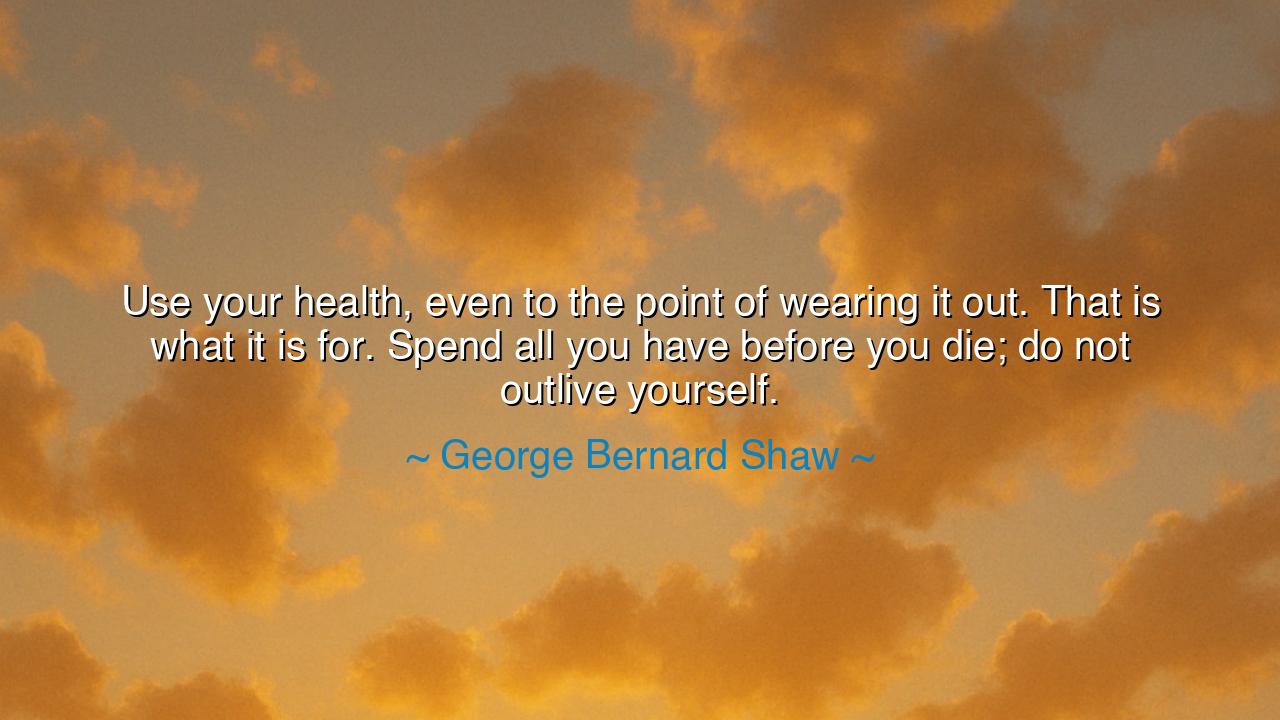
Use your health, even to the point of wearing it out. That is
Use your health, even to the point of wearing it out. That is what it is for. Spend all you have before you die; do not outlive yourself.






The words of George Bernard Shaw, the fiery Irish playwright and philosopher, blaze like a torch passed from one age to the next: “Use your health, even to the point of wearing it out. That is what it is for. Spend all you have before you die; do not outlive yourself.” In these words, Shaw speaks not to the timid or the half-awake, but to those who would live fully — who understand that life, like fire, is meant to burn, not to be stored. His wisdom is both a challenge and a blessing: to live with intensity, to give one’s strength to the pursuit of purpose, and to leave nothing unused for fear of time or decay.
At its heart, this quote is an ode to purposeful vitality. Shaw believed that existence is not a waiting room for death but a workshop of creation, struggle, and meaning. To “use your health” is to honor it — not by conserving it in cowardice, but by spending it in noble endeavor. The body is not a museum piece to be preserved untouched; it is a tool forged for movement, for labor, for joy. The tragedy is not in exhaustion, but in stagnation — not in dying, but in never truly living. As the ancient Greeks said, “A ship is safe in harbor, but that is not what ships are built for.”
Consider the life of Leonardo da Vinci, who embodied Shaw’s creed centuries before it was spoken. Leonardo’s mind never rested; he painted, designed, dissected, and dreamed until his body could no longer keep pace with his vision. He used every ounce of strength, every heartbeat of curiosity. Though he died weary, he died fulfilled. He had not “outlived himself,” for he had given all that he was to the world. In contrast, how many souls today live cautiously, guarding their energy, saving their courage — only to discover too late that unlived years are not the same as life?
Shaw’s admonition, “do not outlive yourself,” carries a haunting beauty. It warns us not to let our spirits die before our bodies do. To outlive oneself is to lose the fire of passion while the heart still beats — to drift through days empty of purpose. The ancients called this state “living death.” In their eyes, the greatest tragedy was not to fall in battle or labor, but to fade in comfort, untouched by struggle. To live fully is to risk wear, to risk fatigue — but it is also to taste the fullness of existence that the fearful will never know.
The philosopher Seneca, in his letters to Lucilius, wrote something akin to Shaw’s wisdom: “It is not that we have a short time to live, but that we waste much of it.” Both men spoke across time to the same truth — that life’s richness depends not on its length, but on its intensity. To live well is not to count the years but to fill them. The candle that burns bright may burn shorter, but it illuminates the world. So too with the human soul: better to burn in purpose than to linger in shadows.
There is also a deeper moral beneath Shaw’s boldness — a call to fearlessness in the face of mortality. He does not glorify recklessness or self-destruction, but invites us to meet death with no regrets. He understood that time is a currency meant to be spent wisely, not hoarded. Every act of love, creation, and courage is a transaction with eternity. To spend oneself fully in the service of one’s calling is to defeat death long before it comes. For what is death to the one who has already given all he has to give?
The lesson, then, is clear: live as though your strength were a gift on loan from the gods — to be returned only after it has been used for something worthy. Work while you have breath, love while your heart beats strong, speak your truth while your voice still carries. Do not save your energy for a tomorrow that may never come. Better to die weary and fulfilled than to live untouched and unspent.
And so, let Shaw’s words echo in your heart like the voice of an elder before the fire: “Spend all you have before you die.” Pour yourself into your days until your health, your talent, and your time have all been used in the service of something greater than yourself. For when your body is worn and your strength gone, you will smile knowing that nothing of your gift was wasted. You will not have merely lived — you will have fulfilled the reason you were alive at all.






AAdministratorAdministrator
Welcome, honored guests. Please leave a comment, we will respond soon